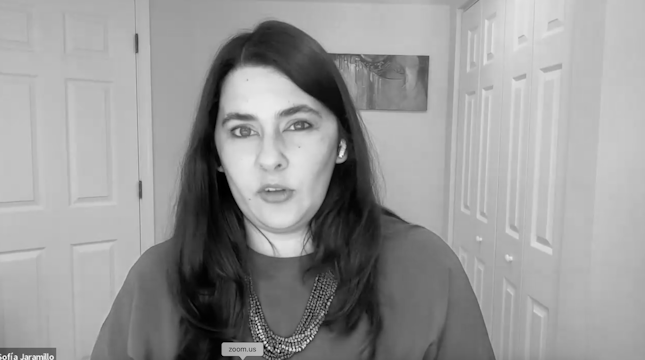The Right to Protest: Webinar examines Global Reflections on the ACHPR Decision in the WOZA v. Zimbabwe Case
Share

Across the world, authoritarian regimes have limited full enjoyment of the right to protest. These governments make it difficult to organize protests, create disproportionate responsibilities for protest organizers, and essentially criminalize protests.
It’s that difficult reality examined Wednesday, particularly in light of the African Commission on Human and Peoples’ Rights’s recent decision, during a webinar hosted by Robert F. Kennedy Human Rights and the International Center for Not-for-Profit Law.
Panelists included UN Special Rapporteur on the Rights to Peaceful Assembly and of Association, Clément Nyaletsossi Voule; Jenni Williams, Executive Director, Women and Men of Zimbabwe Arise (WOZA); Rose Hanzi, Executive Director, Zimbabwe Lawyers for Human Rights; Sofía Jaramillo, Senior Staff Attorney for Civic Space, RFK Human Rights; and Moderator Irene Petras, Regional Director for Sub-Saharan Africa, International Center for Not-for-Profit Law.
Special Rapporteur Voule, renowned for his exceptional, long-standing work on civic space generally - and right to protest particularly – opened the panel noting that, even in some democracies, unacceptable laws exist where protestors have to request permission before the protest. He stressed that the requirement for obtaining government authorization prior to the exercise of the right to protest is contrary to international human rights law. Advocating for notification rather than authorization, Mr. Voule called on all states to promote the right to protest and abide by international and regional standards.
In late 2022, the African Commission issued a positive, precedent-setting decision in Communication 446/13 between Jennifer Williams, Magodonga Mahlangu, and Women of Zimbabwe Arise (WOZA) and the Republic of Zimbabwe. Finding that the government of Zimbabwe violated the applicants’ rights to freedom of association, assembly, expression and their right to liberty, among other rights, the Commission urged the government to investigate, prosecute, and punish all state actors responsible for the violations. Robert F. Kennedy Human Rights and Zimbabwe Lawyers for Human Rights represented the applicants in this case.
WOZA is an activist organization that mobilizes Zimbabweans to demand social justice through peaceful protests and public demonstrations. From 2003 to 2013, the applicants were subjected to arbitrary arrests and detentions as reprisal for conducting public demonstrations in different parts of Bulawayo and Harare. In the days preceding a protest against incessant power outages, government agents raided WOZA’s offices, confiscated organizational materials, and targeted members, severely limiting their ability to carry out the activities of the organization. While the named applicants were the main targets of the government's repression, over 10,000 WOZA members also have been arbitrarily detained and/or attacked in the last 20 years.
Condemning the actions of the government, the African Commission applied its Guidelines on Freedom of Association and Assembly in Africa, which provide that “participating in and organizing assemblies is a right and not a privilege, and thus its exercise does not require the authorization of the State.” This decision sets an important precedent, as it is the first time a mechanism of the African human rights system has held that peaceful protests without prior authorization, even when required by domestic law, should enjoy a presumption of legality. The African Commission further reiterated that assemblies should not be automatically penalized due to failure to notify the State, and the State has a duty to facilitate an environment conducive to the exercise of this right. This decision elevates the provisions of its guidelines on notification regimes from persuasive guidance for States to binding interpretation of States obligations under Article 11 of the African Charter on Human and Peoples' Rights.
The decision, RFK Human Rights’ Jaramillo noted, “talks about the closing and the disintegration of the rights to freedom of assembly, expression, and association. The commission noted that these rights are intertwined – they form the foundations of a democratic society.”
Drawing parallels and comparisons with the Inter-American Court of Human Rights in the Americas, she said, “we hope this decision can influence the local jurisprudence, both of the Inter-American system but also of local courts.”
WOZA’s Williams revealed that, despite winning this case, Zimbabwe has retrogressed in the right to protest.
“We understood the decision was not a ruling, but we felt that the length and long suffering that we went through to get that communication is that we should have been able to engage with the Zimbabwe government,” she said.
Williams noted that WOZA had delivered letters to government officials, and has also asked for meetings, but as of yet, have received no replies. “It’s a shame as a Zimbabwean and a shame on the Minister of Justice ... .there has been no engagement,” she said.
Still, she called the WOZA decision “an incredible victory.” Even, she said, “if it is not so effective for us in Zimbabwe, we know that some people somewhere will enjoy that right because of the sacrifices of the WOZA members.”
However, she asked, how can these recommendations ultimately be made more meaningful?
Much of the solution stems from aggressive advocacy and documentation, Hanzi said. “We need to be mapping how the law enforcement or governments are reinventing or restrategizing; how they respond to these issues. We must continue to see how we can advocate for the reform of law enforcement, especially where there is a provision of the Constitution they should be conforming.”
Those actions are especially important as Zimbabwe heads toward the August 2023 elections and attacks against civic space, including the repression of assemblies, are likely to increase.
Help Us Protect Human Rights
Please give now. Your contribution will make a difference in the critical effort to achieve equal rights for all.